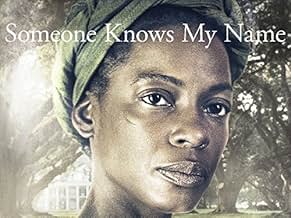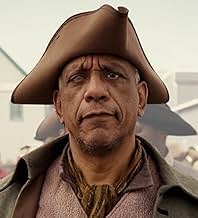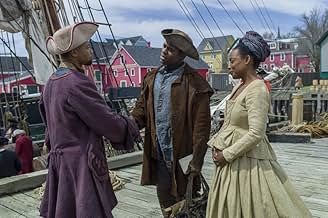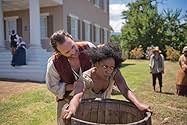Füge eine Handlung in deiner Sprache hinzuKidnapped in Africa and subsequently enslaved in South Carolina, Aminata must navigate a revolution in New York, isolation in Nova Scotia, and the treacherous jungles of Sierra Leone to secu... Alles lesenKidnapped in Africa and subsequently enslaved in South Carolina, Aminata must navigate a revolution in New York, isolation in Nova Scotia, and the treacherous jungles of Sierra Leone to secure her freedom in the 18th century.Kidnapped in Africa and subsequently enslaved in South Carolina, Aminata must navigate a revolution in New York, isolation in Nova Scotia, and the treacherous jungles of Sierra Leone to secure her freedom in the 18th century.
- Auszeichnungen
- 19 Gewinne & 26 Nominierungen insgesamt
Folgen durchsuchen
Empfohlene Bewertungen
10cjde
my recorder is filled with quality Black history programming of all sorts. i love me some Black history like crazy but didn't think i needed to see another "slavery" story but boy was i wrong. this one was different! what an amazing story and very well done! lots of unexpected twists and turns and what a unique and amazing heroin Aminata Diallo was. wow!! that is a name i will never forget. i can't say that i have seen every movie or mini-series and i Roots is in a category by itself. it was an epic event - not just a miniseries. but Book of Negros was a really refreshing take on the slavery story, one that i am ashamed to admit i was totally unaware of. i can't wait to watch it with my daughter when she comes home for spring break. i did not expect a program of this quality from B.E.T. but was very pleasantly surprised. not sure what the ratings were but certainly help they will be encouraged do more stories like this that show the many and varied heroes and heroines that we are. Thank You B.E.T.!!! something i haven't said in many years, if ever!
The Book of Negroes was an eighteenth century British document detailing all the Afro-Americans who had fought on the British side in the Revolutionary war, and were promised a new life elsewhere. A considerable number ended up in Nova Scotia and New Brunswick. There were problems with the harsh climate and petty racism, but it was better than the alternative.
This program takes its name from that, and the first episode looks quite satisfying, as we trace a black girl's odyssey from Mali to America.
So far, it does not seem much different from Roots, but I will keep watching to see if something original turns up.
This program takes its name from that, and the first episode looks quite satisfying, as we trace a black girl's odyssey from Mali to America.
So far, it does not seem much different from Roots, but I will keep watching to see if something original turns up.
Aminata Diallo (Aunjanue Ellis) is captured from her West African village and sent into slavery. She falls for Chekura, a boy in the slaving party. He in turn is also sold. She is sold to the cruel Robinson Appleby. She resists his advances and eventually has a child with Chekura. Rosa Lindo is a sympathetic white woman but she dies. Her husband Solomon is able to buy Aminata but also brokers the sale of Aminata's child away from Robinson. Aminata escapes from Solomon to live in NYC's Canvas Town during the American Revolution. She is befriended by Revolutionary bar owner Samuel Fraunces (Cuba Gooding, Jr.). Chekura manages to escape and join Aminata. She is also befriended by British Cpt. John Clarkson (Ben Chaplin). At the war's end, she helps to record names of slaves into the Book of Negroes for slaves who supposedly served the British Army for one year and thereby earning their freedom.
It's great for this little mentioned part of history to be made. Also Aunjanue Ellis is a very compelling actress. I can do without Cuba Gooding Jr. doing an accent. Also Rick Roberts doesn't fit my image of General Washington. Aminata directly challenging Washington on slavery seems too obvious and on the nose. It's unrealistic. The story is rushed through a long winding life. I can understand the need for it. However it does feel sometimes like a highlight reel. The production and directions are mostly TV movie level. Ellis is able to elevate the production almost by the sheer power of her will.
It's great for this little mentioned part of history to be made. Also Aunjanue Ellis is a very compelling actress. I can do without Cuba Gooding Jr. doing an accent. Also Rick Roberts doesn't fit my image of General Washington. Aminata directly challenging Washington on slavery seems too obvious and on the nose. It's unrealistic. The story is rushed through a long winding life. I can understand the need for it. However it does feel sometimes like a highlight reel. The production and directions are mostly TV movie level. Ellis is able to elevate the production almost by the sheer power of her will.
I thought I had found the wrong series when first I saw lead actor Aunjanue Ellis on the DVD jacket-cover with a modern look (including makeup). A far cry from the book's original cover that included a modest, much darker-skinned woman whose look was to reflect that of being enslaved most of her life.
But that's just the start of my experience with this series.
I had read and enjoyed every gritty details of the book, simply because it was raw and heart-breaking, meant to make the reader feel something beyond their grasp. All of the ugly elements and consequences of rape, humiliation, personal loss, just to name a few things that rob someone of their dignity. The series seemed to cater to the ever-sensitive TV viewers who very likely needed to see slaves fully-clothed, clear-skinned, and bright-eyed. The series left out shocking details from the book, such as the infants that were thrown overboard (alive) on the first ship to the Americas. Once again, TV & Film find it too easy to spoon-feed the viewer only as much as they need to.
This series consisted of six episodes. Surely they had some time to show a few shocking moments from the book.
What's more, the very obvious sexual tension between Aminata and Sam seemed to be added for the viewers' pleasure since an absent husband just isn't as romantic.
These details that the readers of the book know about that the viewing audience doesn't makes me wonder if there ever will be a bridge between literature and screen-writing, as we see it time and time again.
I realize that this work is meant to be separate, and that Lawrence Hill did not write the screenplay, but I can't help but wonder why it is so necessary to take a subject as serious as this, during times like we are in now, and water it down with so much Hollywoodism.
My answer for those who read the book and wonder if they'll also enjoy the series?: No. I did give it two stars simply because I did enjoy the cast and for what it's worth, they did a good job. The costuming, cinematography, sound.. all of it good, but just a disappointment when you know how the story goes and end up with so much less than you hoped.
But that's just the start of my experience with this series.
I had read and enjoyed every gritty details of the book, simply because it was raw and heart-breaking, meant to make the reader feel something beyond their grasp. All of the ugly elements and consequences of rape, humiliation, personal loss, just to name a few things that rob someone of their dignity. The series seemed to cater to the ever-sensitive TV viewers who very likely needed to see slaves fully-clothed, clear-skinned, and bright-eyed. The series left out shocking details from the book, such as the infants that were thrown overboard (alive) on the first ship to the Americas. Once again, TV & Film find it too easy to spoon-feed the viewer only as much as they need to.
This series consisted of six episodes. Surely they had some time to show a few shocking moments from the book.
What's more, the very obvious sexual tension between Aminata and Sam seemed to be added for the viewers' pleasure since an absent husband just isn't as romantic.
These details that the readers of the book know about that the viewing audience doesn't makes me wonder if there ever will be a bridge between literature and screen-writing, as we see it time and time again.
I realize that this work is meant to be separate, and that Lawrence Hill did not write the screenplay, but I can't help but wonder why it is so necessary to take a subject as serious as this, during times like we are in now, and water it down with so much Hollywoodism.
My answer for those who read the book and wonder if they'll also enjoy the series?: No. I did give it two stars simply because I did enjoy the cast and for what it's worth, they did a good job. The costuming, cinematography, sound.. all of it good, but just a disappointment when you know how the story goes and end up with so much less than you hoped.
This mini series is artfully and authentically written, acted and directed. Ms. Ellis and the cast are compelling and so believable. The story itself offers more of the complexities of the people and time period and reminds us of the vastness of a history that we have accepted on face value, as told to us from a very limited set of perspectives. This view hit me hard. A lesser told story of the Black family under the assault of genocide, racism, poverty, persecution and unthinkable acts of terror is explored here. The love story that often takes a second seat to those events, is, here, given a fuller and deeper expression. It was painful but so authentic, I was compelled to watch each episode and encourage all to do the same. There are a few moments when you want your children to close their eyes, and many when they will have questions and comments. It also demonstrates how even when the Caucasians considered themselves "good" to blacks, they were so entrenched in racism and superiority that they had to be made to know that their "good" was self-serving and constrained by their own indoctrination that they were inherently "better." It's a great way to explore history. Watch it.
Wusstest du schon
- WissenswertesBased on the name of the book that really existed, that had the names of Negroes who served the British during the Civil War, then were freed and sent to Nova Scotia to live. Publishers changed the name of the book from "Book of Negroes" to "Someone Knows My Name" because the term "Negro" has become a derogatory term to many people in the U.S., and sellers were hesitant to sell a book with that word in the title.
Top-Auswahl
Melde dich zum Bewerten an und greife auf die Watchlist für personalisierte Empfehlungen zu.
- How many seasons does The Book of Negroes have?Powered by Alexa
Details
- Erscheinungsdatum
- Herkunftsland
- Sprache
- Auch bekannt als
- Someone Knows My Name
- Drehorte
- Produktionsfirmen
- Weitere beteiligte Unternehmen bei IMDbPro anzeigen
Zu dieser Seite beitragen
Bearbeitung vorschlagen oder fehlenden Inhalt hinzufügen

































